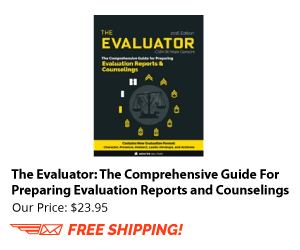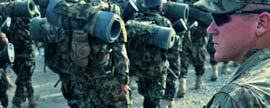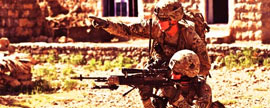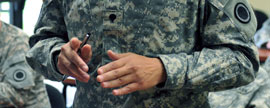Recently I was made aware the Army is considering changes to the NCOER system. The new system is scheduled for implementation by June 2012. I understand the following changes are being considered:
- Senior Raters must address the specific position held by the rated Soldier
- A signature block will be added for CSM/SGM review to indicate the CSM/SGM has reviewed the report
- A referred report concept will be added for SFC and above. Provides the Soldier the opportunity to submit comments along with a derogatory report.
- Removal of counseling dates; invigorate actual counseling within other areas of the NCOER system
- Redesign place of value block and incorporate bullets by individual values
- Remove 3 future assignments and have rater address future assignment positions in Responsibilities and Values section
- Consider creating a Senior Rater profile, similar to the OER system
It is my understanding that these changes are being made in an effort to reduce scoring inflation within the current system. While I applaud the review of evaluation process and believe there is room for improvement in the evaluation process I have some specific concerns:
Rating inflation is caused by raters
First when it comes to the issue of inflated ratings I am not sure I understand the reason for change. When we changed from the older Enlisted Evaluation Report (EER) to the new Noncommissioned Officer Evaluation Report (NCOER) system in the late 80’s one of the primary reasons was to combat inflated ratings. Now some twenty odd years later we are considering changing a reporting system to combat inflated ratings. I would argue that changing the system only stops or inhibits inflation for a period of time until leaders learn the ropes of the new system. I believe the true way to combat inflation is to enforce the standards of the reporting system. This means leaders at all levels need to understand the system and enforce it accordingly. If a rating chain inflates a report the reviewer should address the inflated ratings and hold the rating chain accountable for failing to enforce standards. Changing a form does not combat inflated ratings. Enforcing the standards reduces inflated ratings. The NCO corps should take notice of the Officer Evaluation Report (OER) with regard to reducing inflated rating. Inflated ratings are controlled by the rating chain not by the reporting system.
Counseling dates keep leaders honest
Second I am concerned about the proposal to remove counseling dates from the NCOER form. The counseling dates are a safeguard to ensure leaders inform subordinates of substandard performance. Far too often subordinates receive derogatory comments on their NCOER and never receive the required counseling. Let’s not make it easier for leaders to make derogatory comments about subordinates. Leaders are responsible for mentoring their subordinates. If they are not capable of addressing the issue in writing and proving the subordinate the appropriate counsel to improve they should not be in a position of leadership. I am for any effort that improves leader accountability to ensure counseling is conducted. I suggest any effort that reduces leader accountability and responsibility is an admission that Senior leaders are not holding subordinate leaders accountable with regard to their duty and responsibility to counsel subordinates. Let’s not lower the standard but enforce the standard. Experience tells me Soldiers tend to do those things that are inspected. If counseling is a command priority Soldier will execute it. Counseling done properly helps grow the future leaders of this great Nation.
Leaders find many reasons not to counsel subordinates. Usually the response is “I didn’t have time… I verbally counseled the Soldier. That should be sufficient.” Leaders who use these excuses would find it unfair if their rater used the same excuses on them and then provided a less than favorable evaluation about them. The standard is to inform the subordinate of inappropriate or substandard conduct so that they can improve. Any movement that reduces the responsibility of the rating chain to counsel less or lightens the burden of leader responsibility with regard to counseling or mentoring is inappropriate and a disservice to the rated Soldier. I will be interested to see how the new rating system will invigorate actual counseling. I hope I am proven wrong and that a better counseling system is put in place. The proof will be in the pudding as they say.
It’s not all doom and gloom
On a positive note I applaud the referred report concept, CSM/SGM review box, and the possible implementation of a senior rater profile. I believe these changes will do much to enhance the overall validity of the report. With regard to a senior rater profile I do have some concerns as the NCO corps has not traditionally used this process. It will be very important to ensure the NCO corps is properly educated with regard to the intricacies of the profile process.
In summary, inflation is controlled by leaders who enforce the standard. It is not controlled by changing a rating form. Counseling is a duty and responsibility of a leader. While counseling can be time consuming, it ensures the Soldier knows exactly where they stand with you and documents your actions. Treat your Soldiers how you want to be treated!
For more information about Army evaluations and for over 1,000 example bullet comments, read The Evaluator: The comprehensive guide for preparing evaluation reports















Comments
SGT NICK
This is funny our Brigade CSM said we needed the new system because inflation has gotten out of control, but you hit the nail on the head about holding senior leaders accountable.
chris
if my rater leaves with out giving me my change of rater does my rated time stop till i get it or can it be picked up by the new rater coming in? right now i have an anual due and my rating scheme has changed completly
Mark Gerecht
Chris,
Your should receive a change of rater prior to your rater leaving. A unit might go ahead and complete an NCOER for the rating period by assigning you a new rater but this is not IAW with AR 623-3. It will be unit leadership that makes this call and you must agree with this action. If that does not happen then when your next Evaluation report comes due you should receive a gap report meaning it will cover the period in which you did not receive a report, which will be non rated time. For example: Let’s say you are due an annual and your rater leaves without giving you are report. Then you get a new rater and 90 days later you receive a change of rater. The change of rater report will be a gap report covering your previous annual period and the 90 days for the change of rater. The annual report period that your first rater did not cover will be non rated time on your change of rater report. It is disappointing that a rater left without completing a report on a subordinate leader.
SSG G
CAN TWO SOLDIERS IN THE SAME POSTION BUT DIFFERANT RANK RATE EACHOTHER.
Mark Gerecht
AR 623-3 is fairly clear on the issue. In order to be a rater the individual must be the immeidate supervisor of the Soldier and senior by grade or date of rank. I have attached some excerpts for AR 623-3 for your review. I would encourage you to read AR 623-3, DA PAM 623-3 and AR 600-20
You may also find the following information useful:
AR 623-3 Extract
1-4b(4) Rating chains correspond as nearly as practical to the chain of command and supervision, are drawn up by name, given effective dates, published, and made available to each rated Soldier and each member of the rating chain. Any changes to rating chains will also be published and distributed. No changes may be retroactive.
1-8 d(3)(b)The rater will ensure that the rated officer or rated NCO receives a copy of the rater and senior rater’s support form. This will provide the rated Soldier essential rating chain direction and focus to aid in developing subsequent support form. A face-to-face discussion of duties, responsibilities, and objectives between the rater and the rated Soldier assists in drafting support form.
2-4 The rater will normally be the immediate supervisor of the rated Soldier. The rater will normally be senior by grade or date of rank (DOR) to the rated individual. Commanders will normally rate commanders. Civilian raters for OERs and NCOERs will be designated as official supervisor on the established rating scheme approved by the commander. Civilian raters for NCOERs will be designated and qualified by grade. The minimum grade to be a civilian rater is general schedule (GS) 07.
2-5a Rater Requirements. The rater will be the person (immediate supervisor) in the rating chain that directs and is most responsible for the rated Soldier’s performance. The rater will be the immediate supervisor that monitors/observes the day to day performance of the rated individual and directly guides the rated Soldier’s participation in the organization’s mission. The following describe the requirements by form.
2-5 c. NCOER rater eligibility. The military rater will be a SGT or above and senior to the rated NCO by grade or date of rank (see AR 600–20).
ASKTOP.net Information:
Can I be rated by people not in my rating chain:
GiPubs.com Products
The Evaluator
Rater Quick NCOER
Did you find this information useful?
SFC L
Leaders,
Are there any published examples of this new NCOER form and any new updated info concerning the proposal?
Mark Gerecht
SFC L,
To my knowledge there are no examples. There is no specific information on the new form or procedures other than what I have read in the Army Times and briefings. I will attempt to contact the Army POC in the next week or so to see what I can find out. I expect that the Army will release the new AR 623-3 sometime between April and June of 2012.
I understand the major changes may include a new process for counseling and perhaps a senior rating profile similar to the officer OER. Meaning above center of mass, center of mass, below center of mass.
Will keep you posted on what I see and hear.
Did you find this information useful?
TOP
CARLOS A. LEWIS
Greetings,
I brought this change up to the SMA and Post CSM at Fort Bliss. Of course there need to be a change for SFCs and above. As I have stated those Senior NCOs Rating need to be expounded more. How can a Post CSM or any CSM have their NCOER done with a minimum of 3 bullets in each area…that does not cut it…As to removing the counseling dates I think that is wrong…we need to keep those Raters in check as to their obligation to their Soldiers…keep that the same.
Thanks
Carlos Lewis
CSM(R)
SFC A
CSM(R)Gerecht,
I am a Senior NOC in a section that has alot of issues with Soldier duties and one of biggest issues is that i have been in this section for 6 months and have not received an initial counseling. I have brought it to the chain of command and now there is an Officer who will be rating me who has already shown disrespect towards me and the corp. What is your advise on my current situation.
Mark Gerecht
Be careful what you ask for! I would encourage you to consistently maintain a positive attitude and tone. Be professional and unemotional in all your communications. I would be an active participant in the counseling process. Keep a notebook of your accomplishments so that you can provide input to your rater during each counseling session. When you consistently maintain a positive attitude and do your absolute best while be loyal it is hard even for the meanest individual to treat you poorly. If I had more specifics I could probably provide a best solution or recommendation but the foundation of these types issue is to improve the communication process. I had a leader give me the following advice when I was a young leader: Let those in charge be in charge…when not in charge have the good grace to let those in charge be in charge.
SFC S
I don’t know what to think of the Senior Rator Profile… What happens when one company has two two extremely strong Platoon Sergeants and the other has two substandard ones? Co CDR is the senior rator, so does the lesser of the strong get a centermass mark in one company and the better of the weak NCOs get above center mass? If there is a profile it should be the CSMs. Most companies only have 2-3 SFCs and only 50% get the ACM mark…
Mark Gerecht
SFC S, I have not seen a new regulation for Senior Rater Profiles. Based on your comments I am assuming the proposed changes for the NEW NCOER will now have a Senior Rater Profile similar to the one used by Officers. If this is correct do you have any information I can review on this subject.
SFC S
I don’t have any, I was reacting to the original post CSM, and a slide deck that was dessiminated thoughout our unit a couple months back in regards to this. I personally don’t think that standard line companies have the right composition to support a senior rator profile for the SFCs. It could start at MSG… An LTC has enough 1SG/MSGs and experience to do this correctly, but not a CPT.
Mark Gerecht
If we actually go to a senior rater profile system it will be a significant change for the NCO corps. I will be interested to see how the new AR 623-3 shakes out.
SFC H
I think that the NCOER program has become a fake with too many fingers in the pot and to have a CSM review a NCOER on an E-5 just adds to the fingers. Example in my chain of command my CSM kicks back NCOERS that has words that he doesn’t understand and has the NCOER confused with awards. The NCOER is an evaluation that should help the Soldiers improve as a Soldier and should be constructive not a trump document for advancement.If a Soldier is not doing his job it reflect that if it is infact true and should not be changed by anyone in the chain of command. Just my thoughts.
Jeffrey C. Bentley
My comment is pretty much in agreement with the writer, it is the leaders that fail to do their jobs as leaders. Senior leaders are the biggest culprets of this injustice to subordinates, by not doing there written counselings.